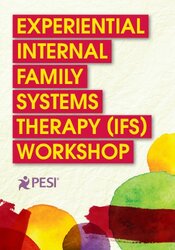

As a young therapist, I often struggled to get results. I avoided my client’s internal emotions and instead tried to control the difficult symptoms I was seeing – which led to heated arguments and frustration rather than progress.
When I started listening closely to my clients, I finally discovered the answer to healing and transformation…
As clients would talk about their different parts (and how the parts felt pain and emotions), I realized that was the key – we have to free each part from the trauma, abuse, attachment injuries and suffering that they feel.
Since I began developing Internal Family Systems (IFS) therapy 30 years ago, it has been scientifically tested to be effective at helping a wide variety of mental health conditions – such as trauma, addiction, anxiety, and depression – which is why it is one of the fastest-growing approaches in therapy.
Hailed by Dr. Bessel van der Kolk, IFS therapy will transform your clients’ lives as they learn to heal themselves. No more therapist directives or insights, rather IFS therapy will provide a connection with your client that creates lasting healing.
Please join me and PESI for this unique recording. I will give you valuable feedback, guided instruction, and share powerful in-session videos of IFS therapy in action. I want to give you the skills you need to use IFS therapy, so you can improve what you’re doing in the therapy room – and see transformation in your clients’ lives.
Richard Schwartz, PhD
This product is not endorsed by, sponsored by, or affiliated with the IFS Institute and does not qualify for IFS Institute credits or certification.
| File type | File name | Number of pages | |
|---|---|---|---|
| Manual - Internal Family Systems Therapy (IFS) (0.72 MB) | 23 Pages | Available after Purchase | |
| Manual - Internal Family Systems Therapy (IFS) - French (0.72 MB) | 23 Pages | Available after Purchase | |
| Manual - Internal Family Systems Therapy (IFS) - Italian (0.72 MB) | 23 Pages | Available after Purchase |

Richard Schwartz, PhD began his career as a family therapist and an academic at the University of Illinois at Chicago. There he discovered that family therapy alone did not achieve full symptom relief, and in asking patients why, he learned that they were plagued by what they called "parts." These patients became his teachers as they described how their parts formed networks of inner relationship that resembled the families he had been working with. He also found that as they focused on and, thereby, separated from their parts, they would shift into a state characterized by qualities like curiosity, calm, confidence and compassion. He called that inner essence the Self and was amazed to find it even in severely diagnosed and traumatized patients. From these explorations, the Internal Family Systems (IFS) model was born in the early 1980s.
IFS is now evidence-based and has become a widely-used form of psychotherapy, particularly with trauma. It provides a non-pathologizing, optimistic, and empowering perspective and a practical and effective set of techniques for working with individuals, couples, families, and more recently, corporations and classrooms.
In 2013, Schwartz left the Chicago area and now lives in Brookline, MA where he is on the faculty of the Department of Psychiatry at Harvard Medical School.
Speaker Disclosures:
Financial: Dr. Richard Schwartz is the Founder and President of the IFS Institute. He maintains a private practice and has a employment relationship with Harvard Medical School. He receives royalties as a published author. Dr. Schwartz receives a speaking honorarium, recording, and book royalties from Psychotherapy Networker and PESI, Inc. He has no relevant financial relationships with ineligible organizations.
Non-financial: Dr. Richard Schwartz is a fellow of Meadows Behavioral Healthcare and is a member of the American Family Therapy Academy and the American Association for Marital and Family Therapy. He is a contributing editor for Family Therapy Networker. Dr. Schwartz serves on the editorial boards for the Journal of Feminist Family Therapy, the Contemporary Family Therapy, the Journal of Family Psychotherapy, and the Family Therapy Collections.
The IFS Technique
Step 1: Identify the Diagnoses & Symptoms
Please wait ...